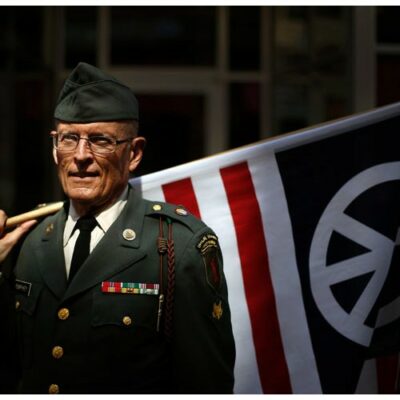On Sunday, September 10th, I stood outside FirstEnergy Stadium, home of the Cleveland Browns, to greet Steelers and Browns fans eager to attend the first game of the regular season. I was impressed with so many people reaching to shake my hand and thank me for my service, as I wore my vintage army dress uniform and held a peace flag. I said to one man, “You would think I was running for office” and he said, “Maybe you should.”
A few people said they liked my flag and I said, “I wish everyone did.”
However, it was not all was sunshine and roses. Some people ignored my cheery greeting and there were a lot of stern faces. On the other hand, one of the “perks” of the day was having at least three sweet young things give me hugs and kisses. Very nice. Made my day. (To clarify, the sweet young things were women.)
I talked with a couple of bomb-sniffing dog handlers who work for K2 Solutions based in North Carolina. The company has contracts with nearly all National Football League teams to work security at games. Their dogs, of different breeds, are trained to detect nitrogen compounds, as some, such as ammonium nitrate, are used to manufacture bombs. (Oklahoma City bomber Timothy McVeigh used ammonium nitrate to produce a bomb that destroyed the Alfred P. Murrah Federal Building in Oklahoma City in April, 1995, killing 168 people, including many children, and injuring 680 people.)
I asked a woman dog handler outside the Browns stadium what the dog’s range is–how far away he can be and still detect a chemical compound that includes nitrogen. She said, “Two football fields away, provided the dog is downwind from the nitrate.”
I was very impressed. I talked with one of her dog-handling colleagues and mentioned that conversation to him. He told me of one instance where a dog detected a nitrate compound on a prospective passenger at an airport security checkpoint. Homeland Security personnel escorted the gentleman to a room for questioning. It turned out the man had a heart condition and the dog had detected a nitrogen compound in the man’s prescription medicine vial he had in a shirt pocket. The vial had only three capsules. (Insert Oh my God!! exclamation here.)
The gentleman dog handler I talked with had been an Army staff sergeant who suffered serious wounds while serving in Afghanistan. The injuries occurred when an improvised explosive device (IED) was detonated, blowing him into the side of a building, causing fractures of both hips, several other broken bones and a punctured eardrum.
Despite our friendly conversation, we were at odds about our presence in the Middle East. He thinks our military is “helping” people there. He told me a story that, prior to his wounds, a young Afghan girl, about six or seven years old, appreciated his presence, walking up to him and hugging his leg. He said that poignant memory convinced him that he would do the same thing all over again, and endure the same injuries and pain, because of that one embrace.
Hours later the question arose in my mind as to whether the veteran ever considered the countless other little girls, boys, mothers and fathers we have slaughtered in Afghanistan, Iraq, Pakistan and Yemen with our weapons of mass destruction–air strikes and Predator drone strikes.
Probably not.


